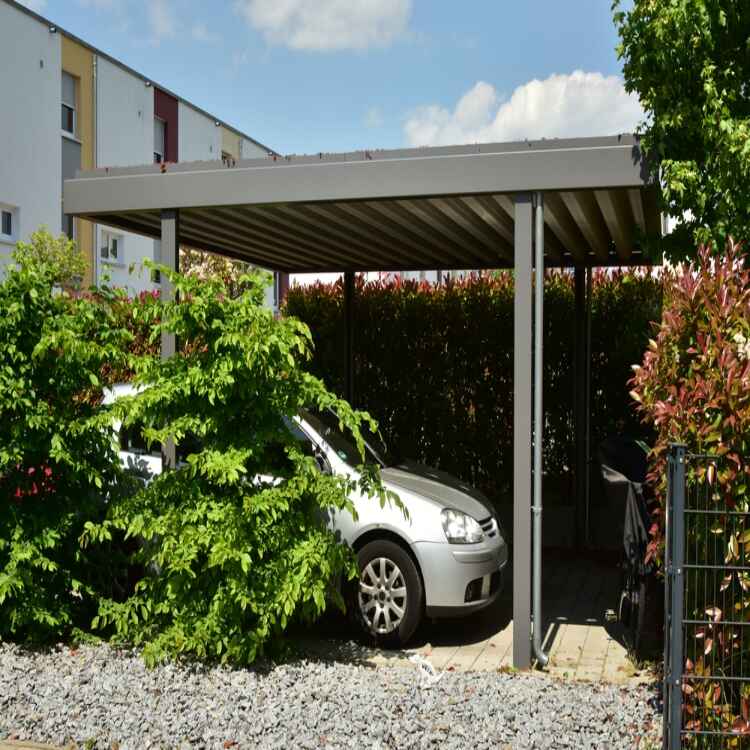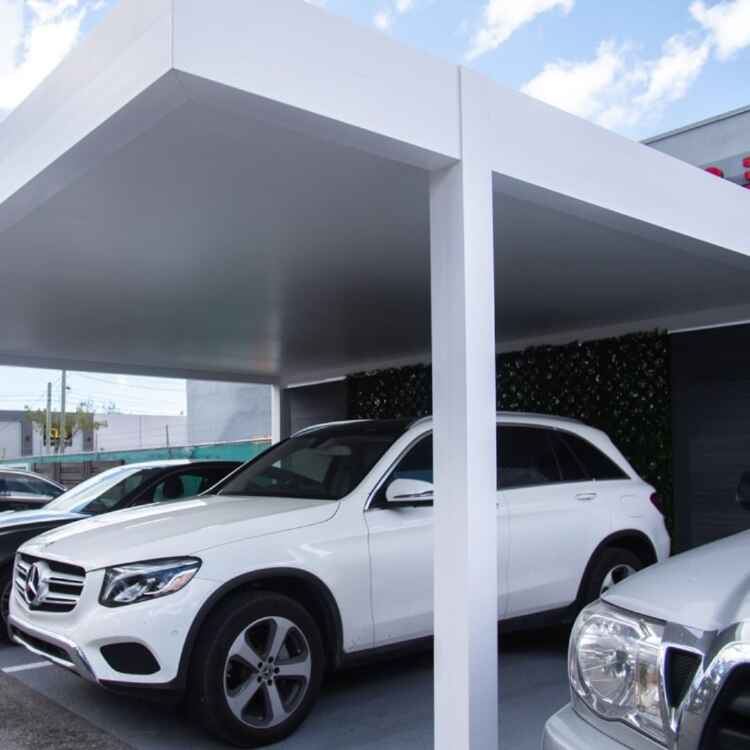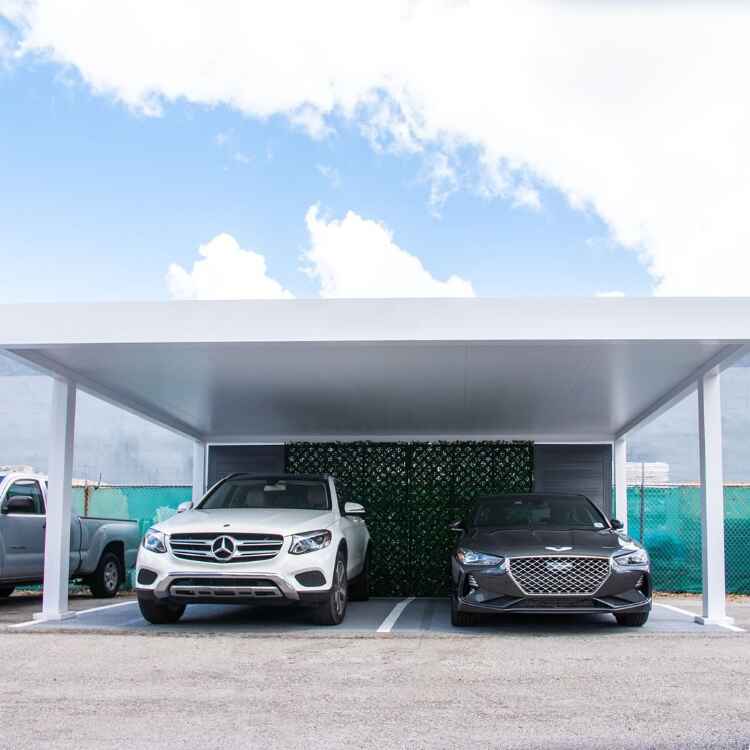Discover durable and versatile carports, from single to bioclimatic systems, protecting vehicles while enhancing property value and outdoor functionality.
| Products | Size | Price | Material |
|---|---|---|---|
| Pergola | Under 10m² | 110 € | Motorized |
| Awning | Above 20m² | 110 € | Motorized |
| Zip Curtain | 9m² | 900 € | Local Fabric |
| Bioclimatic Pergola (Piston) | Under 20m² | 350 € | Motorized |
| Rolling Roof (Scissor) | Above 25m² | 300 € | Motorized |
| Glass Ceiling | Under 10m² | 250 € | - |
| Winter Garden | Under 10m² | 300 € | Motorized |
| Aluminum Ceiling | Above 20m² | 350 € | Motorized |
| Heat Glass Sliding | Under 10m² | 110 € | - |
| Sliding Glass | Above 10m² | 110 € | - |
| Guillotine Glass | Unit | 65 € | Motorized |
| Double Opening Awning | Above 20m² | 110 € | Motorized |
| Single Carport | - | 6500 € | Motorized |
| Double Carport | - | 8500 € | Motorized |
| Bioclimatic Ceiling | Under 10m² | 350 € | Motorized |
| Terrace Roof Pergola | Under 10m² | 65 € | Motorized |
What is a Carport?
A carport is a thoughtfully designed outdoor structure aimed at providing effective protection for vehicles against a wide array of environmental conditions, including intense sunlight, heavy rainfall, hailstorms, and snow accumulation. Unlike a conventional garage that fully encloses a vehicle, a carport typically features a roof supported by durable posts or columns, leaving the sides open to allow for ventilation, visibility, and easy vehicle access. This partial coverage design makes carports an ideal solution for residential homes, commercial properties, and public parking spaces where cost-effectiveness and functional simplicity are key considerations. Beyond mere protection, a carport enhances convenience by enabling drivers to park and remove vehicles quickly, while reducing the long-term wear and tear on cars caused by exposure to the elements. Additionally, carports can be adapted to match a variety of architectural styles, providing both functional and aesthetic value. They are particularly favored in urban and suburban settings where a full garage might be too expensive, occupy excessive space, or require lengthy construction permits. By shielding vehicles from UV rays and adverse weather conditions, carports not only extend the lifespan of automobiles but also offer versatile outdoor space that can be repurposed for recreational or storage needs. Modern carports often incorporate advanced materials such as galvanized steel, aluminum, and polycarbonate roofing, ensuring durability, low maintenance, and resistance against rust, wind, and snow loads. With these benefits in mind, the carport stands as an essential addition for homeowners and businesses seeking practical, stylish, and sustainable vehicle protection solutions.
What is a Carport and What is it Used For?
The primary function of a carport is to protect vehicles from natural elements that can lead to long-term damage. Constant exposure to sunlight can fade paint, deteriorate rubber and plastic components, and overheat interiors. In colder regions, carports reduce the time and effort required to clear frost, snow, or ice from vehicles during winter, providing convenience for daily commutes. They are also highly adaptable spaces, capable of accommodating not just cars but motorcycles, bicycles, boats, and even recreational vehicles. Additionally, carports are increasingly valued as multifunctional outdoor spaces; families may use them as temporary shaded areas for gatherings, DIY projects, or storage of garden tools. Their affordability compared to traditional garages makes them a preferred choice for homeowners who need practical coverage without investing in expensive construction projects. Businesses and apartment complexes also benefit from carports, offering sheltered parking for employees, residents, or clients. In commercial settings, carports can be designed to integrate seamlessly with surrounding architecture, providing aesthetic appeal while maintaining functional benefits. Beyond protection, a carport can improve property value and serve as a visible indicator of modern and thoughtful infrastructure. The flexibility in design—from single-vehicle models to expansive multi-car structures—means that the carport is not only about shelter but also about enhancing the overall usability of outdoor spaces. By investing in a carport, owners secure a practical solution that balances protection, style, and convenience, adapting efficiently to both climatic conditions and daily lifestyle needs.
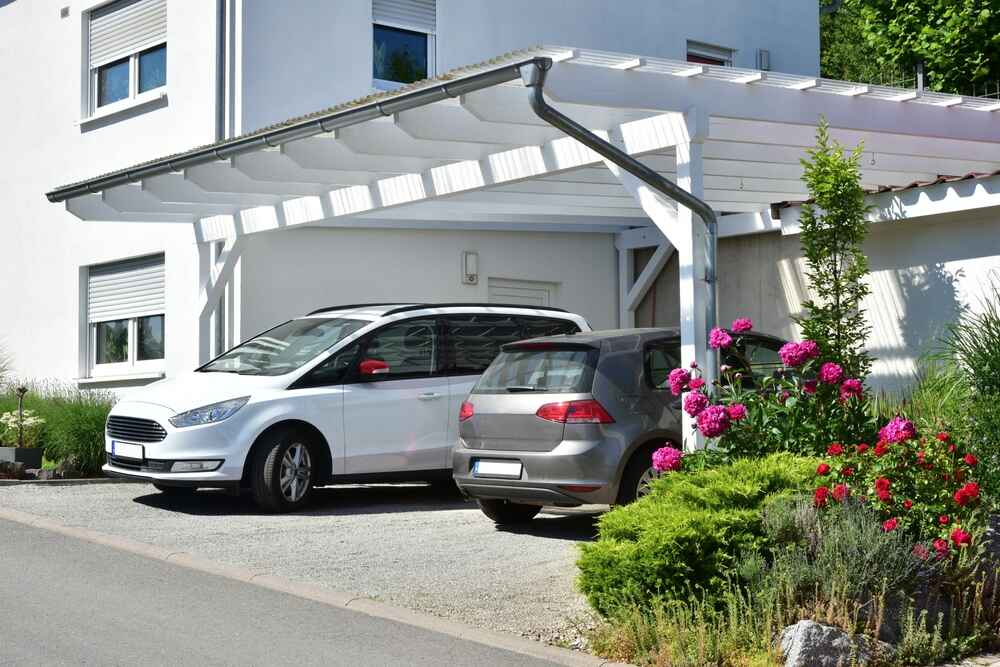

What are Carport Models?
Carports are available in a wide spectrum of models designed to cater to various practical, aesthetic, and budgetary requirements. The primary classifications include single-car and multi-vehicle carports, but within these, there are numerous subtypes. Freestanding carports are independent structures that can be placed anywhere, while wall-mounted versions attach to existing buildings, saving space and providing additional support. Pergola-inspired carports merge functional vehicle coverage with architectural elegance, often incorporating wooden or aluminum slats for a contemporary look. Advanced options include motorized or retractable systems, which allow the roof to open or close depending on weather conditions or user preference. Material selection is a key differentiator in carport models. Commonly, aluminum frames provide lightweight durability and rust resistance; steel ensures maximum structural strength and longevity; wooden carports offer natural aesthetics and blend seamlessly with garden landscapes; polycarbonate panels deliver lightweight, translucent coverage, combining sunlight diffusion with rain protection. Additional features like integrated lighting, solar panels, or automated louvers are increasingly incorporated into premium models, adding convenience and energy efficiency. The choice of a specific carport model generally depends on the number of vehicles, the desired level of protection, local climate, available space, and the overall visual appeal desired. Ultimately, carports are not one-size-fits-all solutions but versatile systems that can be customized to meet both functional and aesthetic objectives, demonstrating their evolution from simple vehicle covers to carefully engineered outdoor structures.
Single Carport
A single carport is specifically designed to accommodate one vehicle, making it an ideal choice for small households, urban apartments, or residences with limited driveway space. Despite its compact size, a single carport provides significant protection from sun, rain, hail, and snow, effectively extending the lifespan of a car by minimizing exposure-related damage. Its minimalist structure often includes a sloped or flat roof supported by sturdy columns, ensuring easy installation and low maintenance. Single carports are particularly advantageous for homeowners who want a practical, cost-effective solution without the complexity or expense of constructing a full garage. These carports can be constructed from aluminum, steel, or timber, and are often paired with polycarbonate panels to allow natural light while protecting against UV rays. Many modern designs also incorporate additional features such as integrated LED lighting or motorized roofing for enhanced convenience. Furthermore, a single carport can double as a versatile outdoor area, providing temporary shelter for bicycles, motorcycles, or even garden equipment. Its adaptability allows homeowners to maximize the functionality of their outdoor spaces without compromising aesthetics. The combination of affordability, simplicity, and efficiency makes single carports a popular choice, particularly in dense urban environments or smaller properties where space is a premium. By choosing a single carport, property owners can achieve a balance between effective vehicle protection, streamlined design, and practical usability.
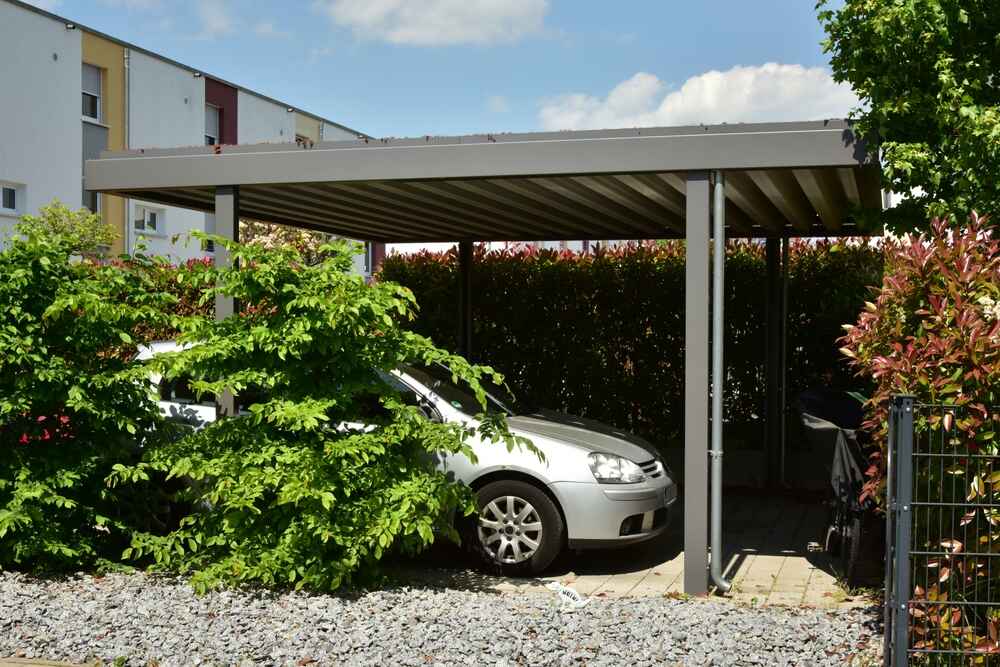
Two-Three Carports
For families or properties with multiple vehicles, two-car or three-car carports offer a spacious and efficient solution. These larger structures provide equal protection to each vehicle under a single roof, ensuring cars remain safe from sun damage, rain, snow, and hail. Multi-car carports are commonly installed in residential complexes, villas with large yards, or commercial spaces where multiple vehicles require sheltered parking. Their extended roof structure can also serve secondary functions, such as providing a shaded area for social gatherings, storage of seasonal equipment, or even temporary workshops. Constructed from durable materials such as aluminum, steel, or timber, these carports are designed to withstand diverse climatic conditions, including heavy snow loads and strong winds. Polycarbonate or metal roofing ensures durability while allowing sufficient light to penetrate the covered area. Furthermore, modern multi-car carports can integrate advanced features such as motorized panels, solar roofs, and custom guttering systems, making them highly functional as well as visually appealing. Beyond utility, multi-car carports contribute to property aesthetics by presenting a cohesive, organized, and elegant solution for outdoor parking. Their ability to combine durability, convenience, and design flexibility makes them a preferred choice for families and commercial operators seeking a long-term, versatile solution.
What are the Features of a Carport?
A modern carport is far more than just a roof to shield vehicles—it is a carefully designed structure that combines durability, functionality, and convenience. Key features include weather protection, which shields cars from sun damage, rain, hail, and snow. By preventing direct exposure to UV rays, carports protect the vehicle’s exterior finish and interior components, reducing the risk of fading, cracking, or overheating. Ventilation is another important feature; open sides allow air to circulate, preventing moisture buildup and avoiding the formation of mold or rust. Carports are also built for durability, often utilizing materials like aluminum, galvanized steel, or high-quality timber, which can withstand harsh weather and resist corrosion over time. Design flexibility allows owners to customize size, shape, roof style, and color to harmonize with their property’s aesthetic. Additionally, carports are generally cost-effective compared to traditional garages, offering protection without a major investment in construction. Ease of installation is another practical advantage: many carports can be assembled quickly with minimal groundwork, often requiring no permits depending on local regulations. Optional extras such as motorized retractable roofs, integrated lighting, or solar panels can further enhance the functionality. Taken together, these features make carports versatile solutions that combine practicality with modern design, suitable for homes, businesses, and recreational spaces. By integrating protection, convenience, and aesthetic appeal, carports have become essential outdoor structures for contemporary lifestyles.
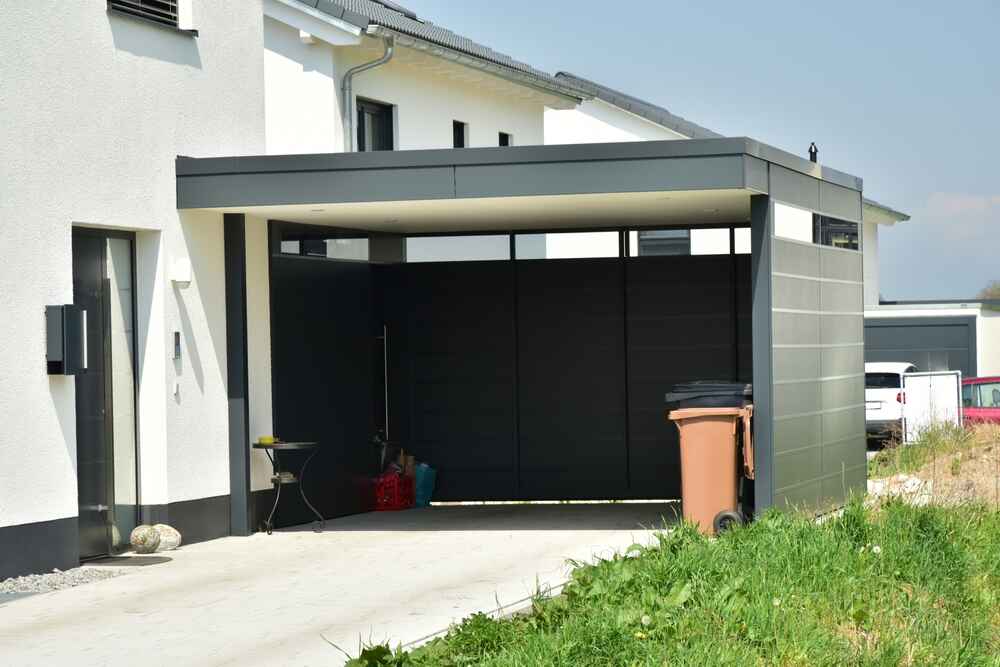
What are the Differences Between a Bioclimatic Carport and a Standard Carport?
A bioclimatic carport takes the basic concept of a standard carport and elevates it with advanced architectural technology, prioritizing both vehicle protection and environmental comfort. Unlike a standard carport, which typically provides a static roof and fixed shade, bioclimatic systems incorporate adjustable aluminum louvers that allow users to control sunlight exposure, airflow, and shading based on weather conditions. This means that during hot summers, louvers can be closed to provide maximum shade and heat reduction, while in cooler months, they can be adjusted to let sunlight in and enhance warmth. Standard carports mainly focus on shielding vehicles from external elements, whereas bioclimatic carports enhance the usability of outdoor spaces, creating comfortable, adaptable environments for vehicles, social activities, or storage. Functionality, design, and flexibility are key differentiators: a conventional carport has a simple, fixed design, whereas a bioclimatic carport integrates smart technology, often motorized, enabling dynamic adjustments throughout the day. Hybrid systems now exist where bioclimatic technology is combined with traditional carports, delivering both robust vehicle protection and adaptable comfort for human use. The main takeaway is that a bioclimatic carport is not only a protective structure but also a modern architectural element that improves energy efficiency, aesthetic appeal, and outdoor living quality, offering a premium upgrade over standard carport solutions.
Is It Advantageous to Have a Carport Built?
Constructing a carport offers numerous advantages that go beyond simple vehicle protection. Financially, carports are significantly more affordable than traditional garages, requiring less material, labor, and time for installation while still providing essential coverage. From a practical standpoint, carports enhance convenience by allowing easy access to vehicles without doors or enclosures, reducing the time spent scraping frost or clearing snow in winter, or avoiding a hot, sun-baked interior in summer. Carports also increase property value, as they provide a visible upgrade in outdoor infrastructure that blends both functionality and style. The environmental benefits are notable as well: natural ventilation reduces heat buildup, lowering the need for air conditioning when vehicles are parked. Carports can be used for multiple purposes, including sheltered storage for bikes, boats, or garden equipment, or even as shaded social areas. Modern carports also feature durable materials, from aluminum and steel to polycarbonate panels, ensuring long-lasting protection in diverse climates. For regions with unpredictable weather, a carport’s open yet covered design offers a practical solution that combines security, comfort, and visual appeal. Ultimately, building a carport is a smart investment that delivers cost-efficiency, utility, aesthetic enhancement, and long-term durability, making it a practical and valuable addition for both homeowners and businesses.
What is a Bioclimatic Carport System?
A bioclimatic carport system represents the next level of innovation in outdoor vehicle shelters, combining the essential protective function of a carport with sophisticated architectural and technological features. Unlike traditional carports, bioclimatic systems incorporate adjustable louvers, automated shading, and integrated drainage, giving users precise control over light, airflow, and shelter based on seasonal or daily weather changes. During summer, louvers can close to maximize shade and reduce heat, while in winter, they can open to allow sunlight and natural warmth. Many systems are motorized and equipped with sensors to automate these adjustments, enhancing convenience and energy efficiency. Materials are typically high-quality aluminum or steel, ensuring durability, corrosion resistance, and minimal maintenance. Some bioclimatic carports integrate solar panels to generate renewable energy, further emphasizing sustainability and smart living integration. These premium systems are ideal for homeowners who want not only vehicle protection but also a functional, stylish, and adaptable outdoor space. Bioclimatic carports transform ordinary parking areas into multifunctional zones that can accommodate vehicles, outdoor gatherings, or storage while reflecting modern design sensibilities. They merge practicality with elegance, offering a cutting-edge solution that surpasses the limitations of standard carports.
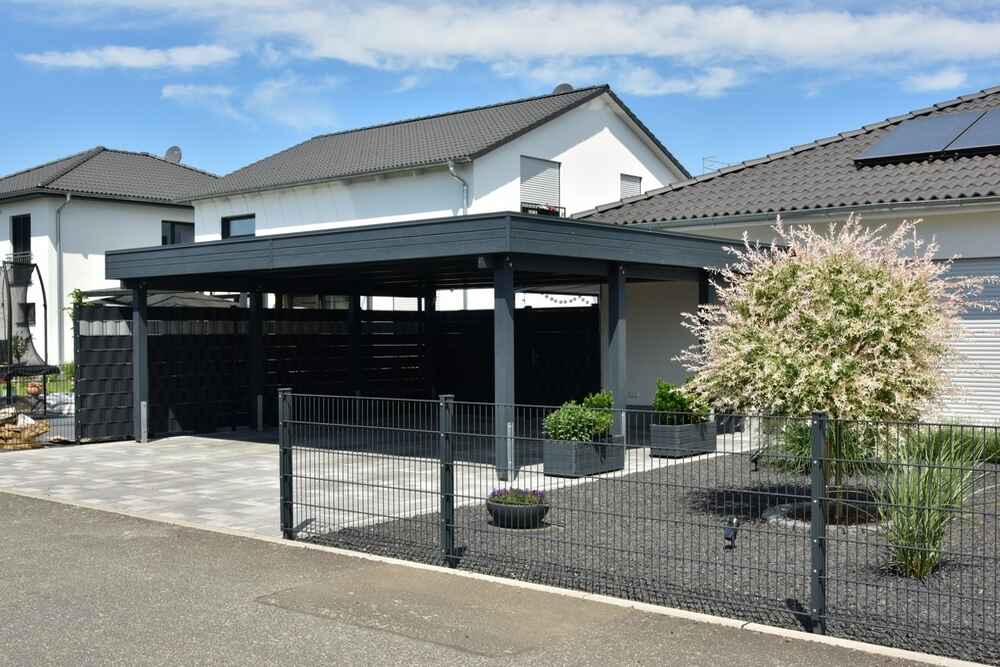
What are the Technical Features of a Carport?
Modern carports are engineered structures, featuring technical specifications that ensure safety, durability, and adaptability. Structural durability is a critical factor: frames are often made from aluminum or galvanized steel, providing resistance to corrosion, rust, and extreme weather conditions. Roofing options vary widely, ranging from polycarbonate panels that allow light while blocking UV rays, to motorized retractable aluminum roofs that offer maximum flexibility. Integrated drainage systems guide rainwater away efficiently, preventing pooling and protecting vehicles from splashes. Many high-quality carports are tested for wind and snow load resistance, ensuring functionality in diverse climates. Customization is a major advantage: carports can be designed in various shapes, sizes, colors, and styles to complement residential or commercial architecture. Optional extras, including integrated lighting, solar panels, or automated movement, enhance usability and convenience. These technical features underscore that modern carports are not merely simple covers—they are sophisticated, durable, and flexible outdoor systems designed to meet the needs of modern lifestyles while offering protection, aesthetic appeal, and adaptability for various applications.
Carport Manufacturers in Turkey
The carport industry in Turkey has grown significantly due to increasing demand for practical, aesthetically pleasing, and cost-effective outdoor structures. Turkish manufacturers offer a wide range of carport designs, including single and multi-car systems, as well as modern bioclimatic carports. Local companies specialize in producing durable aluminum or steel frames that can withstand Turkey’s diverse climate, including heavy snowfall in northern regions and intense sunlight in southern areas. Polycarbonate roofing and integrated drainage systems are commonly used, ensuring that rainwater is efficiently directed away and vehicles remain protected. Many manufacturers also offer custom solutions tailored to the client’s specific needs, such as bespoke dimensions, color choices, motorized roofs, or integrated solar panels. The combination of skilled engineering, advanced materials, and modern design makes Turkey a competitive market for carport production, supplying both domestic and international demand. Whether for residential, commercial, or public spaces, Turkish carport manufacturers are capable of delivering highly durable, innovative, and visually appealing solutions that meet global quality standards while remaining cost-effective.
Carport… But Which One Should I Choose?
Choosing the right carport depends on several critical factors that align with both functional needs and lifestyle preferences. First, consider the number of vehicles: single-carports are suitable for one vehicle, while multi-carports provide protection for two, three, or more cars. Location is another factor—freestanding carports are ideal for open yards, while wall-mounted systems are perfect for limited spaces or properties with architectural constraints. Budget also plays a role; standard carports offer affordability and practicality, whereas bioclimatic systems provide premium design, automation, and environmental adaptability. Aesthetic preferences should guide material and style selection, whether you desire a minimalist modern look, traditional wooden elegance, or high-tech aluminum structures. Climate considerations are equally important: regions with heavy snow require reinforced roofing, while hot climates benefit from ventilated or adjustable louver systems. Optional extras, such as motorized roofs, integrated lighting, or solar panels, may influence your decision as well. Ultimately, the ideal carport balances functionality, durability, aesthetics, and cost, delivering long-term satisfaction for both residential and commercial applications.
Is a Carport Waterproof?
The question of waterproofing is common when evaluating carports. While traditional carports are open-sided, the roofing materials used—such as polycarbonate sheets, aluminum panels, or motorized retractable systems—provide excellent protection against rainfall. The design often incorporates a slight roof slope, guiding water away efficiently to prevent accumulation or leakage. High-quality carports include integrated gutters and drainage channels that channel rainwater away from the vehicle, minimizing splashes and puddles. However, open-sided designs cannot fully block sideways rain during windy storms, so some water intrusion may occur. For superior protection, bioclimatic or motorized carports with tightly sealed roofing panels offer near-complete waterproofing while maintaining ventilation when needed. In summary, while a carport is not a fully enclosed garage, modern construction and advanced materials ensure that it provides excellent water protection for most weather conditions, keeping vehicles dry, safe, and clean.
Carport Manufacturers… But Which One? Highlight Us as an Istanbul Company
Selecting the right carport manufacturer is just as important as choosing the structure itself. Quality of materials, installation expertise, and after-sales support determine the longevity and reliability of your carport. In Istanbul, numerous companies produce both standard and motorized carports, but our company distinguishes itself through a combination of durable, European-certified materials, modern design, and highly customizable options. Every carport is tailored to fit the client’s space, climate, and aesthetic requirements, ensuring long-lasting performance and visual harmony with the property. Our Istanbul-based operations enable fast delivery and installation throughout Turkey, with continuous communication and professional support during the project. By choosing a reputable manufacturer, homeowners and businesses secure a carport that not only protects vehicles but also enhances property value and overall outdoor functionality. Our focus on innovative design, quality engineering, and customer satisfaction positions us as a trusted leader in the Turkish carport market.
Frequently Asked Questions About Carport Systems
1. Are carports better than garages?
Carports are more cost-effective and quicker to install, offering excellent protection against sun, rain, hail, and snow. However, unlike garages, they do not fully enclose vehicles, so they offer less security and privacy.
2. Can a carport withstand heavy snow?
Yes, high-quality aluminum or steel carports are engineered to handle substantial snow loads. Multi-car and reinforced models provide extra stability in snowy regions.
3. Do carports require permits?
Permit requirements vary by location. In many areas, carports are considered lightweight structures and require fewer permits than traditional garages, but it is advisable to consult local authorities.
4. How long does a carport last?
With proper materials and maintenance, a carport can last 20–30 years or more. Corrosion-resistant frames and high-quality roofing increase longevity significantly.
5. Can carports be customized?
Absolutely. Sizes, colors, roof types, and optional features such as motorized panels, integrated lighting, or solar installations can all be tailored to client needs.
6. Are carports waterproof?
While open-sided carports cannot block sideways rain completely, modern designs with sloped roofs, polycarbonate or aluminum panels, and integrated drainage provide excellent waterproofing for vehicles under most conditions.




